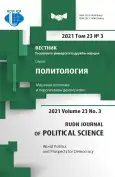Issues of Democratic Development and Construction of National Identity at the End of the Age of Imitations: Editorial Introduction
- Authors: Dutkiewicz P.1, Pochta Y.M.2
-
Affiliations:
- Carleton University
- Peoples’ Friendship University of Russia (RUDN University)
- Issue: Vol 23, No 3 (2021): World Politics and Prospects for Democracy
- Pages: 339-347
- Section: EDITORIAL ARTICLE
- URL: https://journal-vniispk.ru/2313-1438/article/view/322564
- DOI: https://doi.org/10.22363/2313-1438-2021-23-3-339-347
- ID: 322564
Cite item
Full Text
Abstract
In the article, the guest editor Piotr Dutkiewicz and editor-in-chief Yuriy M. Pochta introduce the current issue of the journal, interpreting cross-cutting topics such as democratic development and the construction of national identity in the societies of the East and the West. They believe that the most appropriate heuristic explanation for these issues today is the idea that after the end of the Cold War the hopes for the final victory of the liberal democratic project on a global scale ended in disappointment. The end of history never took place, just like the victory of communism did not take place previously. All these years we have been witnessing an imitation of liberalism, the era of which is already over. There is currently a global revolt against the liberal imitation imperative. From this point of view, there is a great interest in articles devoted to Russian-Turkish relations, the place of the Central Asian states in the international rankings of democratic development, the evolution of the political development of the Lebanese Republic, the formation of democratic political regimes in such Eastern European EU member states as Poland and Hungary, the role of parties in the political life of Great Britain and Nigeria, as well as such theoretical and methodological problems of political science as the processes of forming future political leaders, methodology of the study of GR-management and approaches to the study of the political and psychological characteristics of the heads of Russian regions. In general, this issue of the journal pictures the current state of democratic development of Western and non-Western countries in the context of globalization, which is at the stage of transition from American monopolarity to multipolarity, from imitation of the Western liberal-democratic project to the search for its own development projects. The authors believe that from the point of view of Russia and its interests the materials of this issue allow for outlining the prospects for further research on ways to build the most effective relations with world and regional powers, the possibilities of protecting its sovereignty and its geopolitical interests, and the mechanisms for forming the Russian post-Soviet identity at the national and regional levels.
About the authors
Piotr Dutkiewicz
Carleton University
Author for correspondence.
Email: piotr.dutkiewicz@carleton.ca
ORCID iD: 0000-0001-9749-9116
PhD in Political Science, Professor of Political Science and Director, Centre for Governance and Public Management
Ottawa, CanadaYuriy M. Pochta
Peoples’ Friendship University of Russia (RUDN University)
Email: pochta_yum@pfur.ru
ORCID iD: 0000-0001-9600-2665
Doctor of Philosophy, Full Professor, Professor of the Department of Comparative Politics
Moscow, Russian FederationReferences
- Alekseev, A.V., & Fomin, I.V. (2020). “We, the defenders of nations and liberties”. How the EU populist radical right discursively constructs identities: the case of the Rassemblement National. Political science (RU), 4, 128-156. DOI: http://www.doi.org/10.31249/poln/2020.04.07 (in Russian)
- Aleshin, A.A. (2019). UK Political Elite Approaches to National Security and Defense after Brexit. South-Russian Journal of Social Sciences, 20(4), 8-26 (in Russian).
- Bolonina, A. (2021). Political aspects of “non-recognition of the EAEU by the European Union. Contemporary Europe, 1, 200-208. doi: 10.15211/soveurope12021200208 (in Russian).
- Krastev, I., & Holmes, S. (2019). The Light that Failed. A Reckoning. Allen Lane.
- Pochta, Yu.M. (2020). Islamism and nationalism in the Greater Middle East: Enmity or symbiosis? Asia and Africa Today, 3, 4-11. doi: 10.31857/S032150750008741-7 (in Russian).
- Khakhalkina, E. (2021). “Global Britain”: from idea to implementation. Contemporary Europe, 1, 21-32. doi: 10.15211/soveurope120212132 (in Russian).
- Fukuyama, F. (2018). Identity: The demand for dignity and the politics of resentment. New York: Farrar, Straus and Giroux.
Supplementary files









